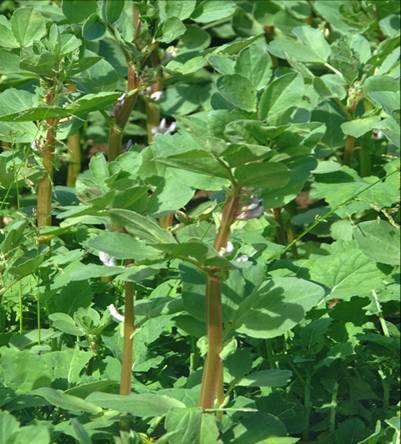
With winter beans now being planted and the crop being vulnerable to early weed competition, growers should be looking to use pre-emergence herbicides such as Nirvana to rid the crop from difficult weeds such as Charlock and Cleavers, according to Richard Peake of Harlow Agricultural Merchants.
Advising farmers in East Anglia, Richard Peake points out that Charlock is one of the most competitive in winter beans, capable of smothering out the crop and causing problems of admixture at harvest, leading to severe price reduction. "Charlock just keeps coming and is a very visible weed in the field. It has largely been ignored as a weed in both beans and rape in the past and there are few herbicides in either of these crops that will control it effectively."
In Richard’s view Charlock has and will become even more of a problem across the rotation, particularly in those specialist oilseed rape varieties grown for their oils and where this weed is regarded as a contaminant. "If Charlock is found in these specialist rapes crops, there is every likelihood that the healthy premia that can be made will be lost. Contamination by pods and seeds is also a major problem in winter beans where Charlock has caused up to 8.5% admixture in the winter bean sample, leading a £25/tonne deduction. Similarly Black-bindweed and Cleavers have caused 4.5% admixture in beans, leading to a £12/t deduction."
"Early and effective weed control in beans not only allows the crop to get established and to grow well, but also protects the crop from any weed contamination at harvest that could potentially hit growers hard in the pockets!"
"The main issue we have when it comes to weed control in winter beans is that we no longer have simazine, which was the standard herbicide for many years. It was also a cheap treatment. So growers have had to take up newer residual herbicides that inevitably cost them more. Using beans as a break crop means that this cost can be spread over the rotation," he says.
"The main broad-leaved weeds to focus on in winter beans are Charlock, Cleavers, Knotgrass Black-bindweed and Volunteer Rape. We used Nirvana for the first time last year and growers were well pleased with its performance. Based on imazamox and pendimethalin, Nirvana gave adequate and long-lasting control of these key target weeds in winter beans. If we needed to boost its Cleaver control, it was mixed with a reduced dose of clomazone," reports Richard.
Jonathan Ball, BASF Legume Product Manager, points out that in winter beans when weed pressure is high, Nirvana should be applied at the full rate of 4.5 l/ha in order to benefit from maximum persistence and optimum efficacy. "For general weed control in low to moderate weed populations, Nirvana applied between 3-4 l/ha will be appropriate. It can also be used at 2.5-3 l/ha in conjunction with suitable tank-mix partners such as clomazone for improved control of certain problem weeds such as Cleavers or Shepherd’s-purse."
Jonathan explains that imazamox enhances the control of several key weeds, such as Charlock, Black-bindweed, Cleavers and Volunteer Oilseed rape, compared with equivalent rates of straight pendimethalin. "Nirvana offers a broader weed spectrum than straight pendimethalin. It also offers useful additional bonus activity in the suppression of grass-weeds such as Black-grass and Annual Meadow-grass, which is very useful in a break crop such as beans."
"With the loss of simazine, Nirvana was bound to take a more significant position in the market as it provides strong residual activity and excellent over-winter weed control, with good crop safety," he says.
Richard Peake says that prospects for winter beans this year are good. "After oilseed rape, it is the most valuable break crop we have. Last year following a poor autumn for rape and wheat, we saw a boost in the area of winter beans grown. Although some crops that were planted under very difficult conditions didn’t perform that well, those that were planted into a good seedbed yielded a very respectable 5 tonne/ha (2 t/acre). We are anticipating a more normal year this season in terms of area grown and providing the crop is well established, we would expect to reflect these good yields. Beans are generally drilled nowadays, compared with mostly ploughed five years ago, and this helps to get the crop established at a reasonable cost. It also avoids the need to take the top off the plough ridges to leave a level seedbed for the sprayer."
